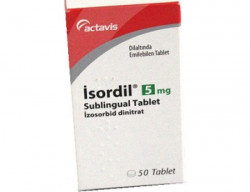Isordil (isosorbide dinitrate) Coupons, Discounts & Cost
Isordil (isosorbide dinitrate) is a drug from the group of organic nitrates for oral use. One way to save money on the Isordil (isosorbide dinitrate) is a drug from the group of organic nitrates for oral use. Isordil (isosorbide dinitrate) retail cost regardless of income and insurance status is to use Isordil coupons or discount cards from RXCoupons. Use our Isosorbide Dinitrate coupons at your online pharmacy and receive up to 75% off the sale price each time you refill your prescription.
What is Isordil (isosorbide dinitrate)?
Isordil (isosorbide dinitrate) is a drug from the group of organic nitrates for oral use. Isosorbide dinitrate has antianginal, vasodilating, spasmolytic effect. This is an effective agent used for the treatment and prevention of coronary heart disease, as well as for the relief of angina attacks.
Isordil helps expand the blood vessels and reduce afterload on the heart. The drug leads to a reduction of oxygen demand. Isordil stimulates the redistribution of blood flow and helps relax vascular smooth muscle.
Isordil is rapidly absorbed (up to 60%). The effect lasts for 15-120 minutes.
Isordil is prescribed for many heart diseases. The drug is used for the prevention of strokes (including the post-infarct phase); for the treatment of chronic congestive heart failure (in conjunction with diuretics and cardiac glycosides); in acute left ventricular failure. Sometimes Isordil is prescribed for endarteritis (inflammation of the inner lining of the arteries) and peripheral artery disease.
Isordil (isosorbide dinitrate) absolute contraindications
Common contraindications for Isordil include: increased intracranial pressure, stroke, collapse, toxic pulmonary edema, angle-closure glaucoma, constrictive pericarditis, cardiac tamponade, liver and kidney failure, severe anemia, idiosyncrasy, children up to 18 years.
Use with caution: tendency to orthostatic hypotension.
Isordil is contraindicated during pregnancy and lactation. It is unclear whether Isordil is excreted into human milk.
Patients who are on maintenance therapy should avoid medications that contain phosphodiesterase inhibitors (e.g. sildenafil) in connection with the risk of angina attack.
Isordil (isosorbide dinitrate) dosing and administration
Isordil is taken 30 minutes before meals (5-10 mg 3-4 times a day). In severe cases, the dosage is increased up to 20-40 mg. Heart failure: take 20 mg every 4-5 hours.
For the relief of angina: 2.5 of 5 mg every 2-3 hours.
The highest daily dose: 160 mg.
The highest single dose: 40 mg.
The tablets can be taken sublingually. If the drug is taken for a long time (more than 3-6 weeks), you need to take a break, because the effectiveness of the drug may be reduced. You can also use Isordil analogue.
Isordil (isosorbide dinitrate) side effects
Patients taking isosorbide may experience some unpleasant side effects, such as nausea, dizziness and headache. Unpleasant symptoms will go away if you reduce the dose. It is strictly forbidden to consume alcohol during treatment with Isordil.
Central and peripheral nervous system: restlessness, dizziness, headache.
Respiratory system: rarely - shortness of breath.
Hematopoietic system: hypocoagulation.
Cardiovascular system: hypotension, tachycardia, collapse.
Digestive system: nausea, vomiting, dry mouth, burning mouth syndrome.
Musculoskeletal system: stiffness.
Dermatological reactions: skin rash, allergic reactions.
Other reactions: visual disturbances.
Isordil (isosorbide dinitrate) overdose
In case of accidental overdose, Isordil may cause orthostatic hypotension, hyperthermia, convulsions. High doses may cause methemoglobinemia.
Isordil (isosorbide dinitrate) drug interactions
Isordil reduces the effect of norepinephrine and epinephrine.
Adsorbents reduce the absorption of Isordil from the gastrointestinal tract. Antihypertensive drugs (beta-blockers, calcium antagonists, vasodilators), procainamide, quinidine, tricyclic antidepressants, antipsychotics, sildenafil citrate and alcohol may increase hypotension and reduce the antianginal effect of the drug. Combination with atropine increases the risk of high intraocular pressure.
Isordil (isosorbide dinitrate) special instructions
Treatment should be started with the lowest recommended dose to avoid hypotension and headache. It is recommended to make a break for 3-5 days after 3-6 weeks of regular intake (in order to prevent the risk of addiction).
Patients taking Isordil should use caution when driving.

